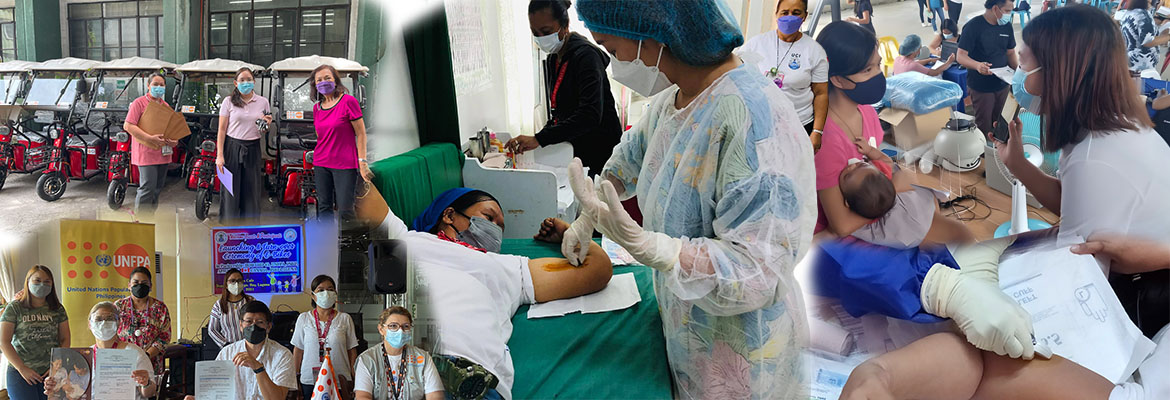
Our Completed Projects
At the Philippine Society for Responsible Parenthood, Inc. (PSRP), we take immense pride in the impactful projects that have defined our commitment to responsible parenthood and enhanced reproductive health. Here’s a glimpse of some of the remarkable projects we’ve successfully completed:
Philippine Implants Suitability Study for Inclusion in National Formulary(2011-2012): This project assessed the feasibility of incorporating contraceptive implants into the Philippine National Formulary (PNF), making them more accessible and affordable for family planning, and contributing to reproductive health in the Philippines.
Development of Clinical Practice Guidelines and FP Training Manuals: This project created comprehensive clinical practice guidelines and training manuals for various family planning methods, essential for healthcare professionals to provide effective and safe family planning services.
- Expanded Program On Implant Contraception: The project’s goal was to expand activities to boost PSI demand and use in the community. The project achieved the following results: trained 42 trainers and 566 health service providers on PSI insertion; reached 246,224 PSI acceptors (2015-2017), initially through public sector outreach missions; and through CSOs and LICs during TRO on implanon.
Emergency Response and Recovery in Typhoon-Affected Regions: This project conducted rapid response and recovery activities in areas impacted by Typhoon Yolanda in Eastern Samar and Leyte, including reproductive health missions, training in Minimum Initial Service Package (MISP), and the operationalization of medical facilities like Hospitainers.
Emergency Response to Typhoons Hagibis, Ruby, and Odette: This project provided immediate assistance and support in regions affected by Typhoons Hagibis, Ruby, and Odette, ensuring the continuity of essential reproductive health services during these emergencies.
Setting the Stage for Minimum Initial Service Package in Emergencies: This project prepared the groundwork for the implementation of the Minimum Initial Service Package (MISP) in emergency disaster situations, ensuring access to critical reproductive health services during crises.
Lot Quality Assurance Sampling for Baseline CPR Assessment(2016-2018): This operational research project conducted Lot Quality Assurance Sampling (LQAS) to establish and validate baseline Contraceptive Prevalence Rate (CPR) data, a crucial indicator for measuring family planning program effectiveness.
Strengthening and Operationalizing CEMONC/Blood Bank in Region 12: This initiative enhanced and activated Comprehensive Emergency Obstetric and Newborn Care (CEMONC) and Blood Bank services in Region 12, specifically in Sarangani, Sultan Kudarat, and North Cotabato.
Fielding Bike Patrol Teams for Underserved Communities: This project deployed bike patrol teams to reach underserved geographic and urban areas, providing information, counseling, and family planning services to the local population, initially with the support of 10 e-bikes.
Emergency Response to Taal Volcano Eruption: This project responded to the emergency caused by the eruption of the Taal Volcano, ensuring the provision of critical reproductive health services to affected communities.
Cash Voucher Assistance for Pregnant Women during COVID-19: This project provided cash voucher assistance to pregnant women during the COVID-19 pandemic, offering financial support to ensure their access to essential healthcare services.
- 24-Hour Ligtas Buntis Help Line (COVID-19 Pandemic): Pregnant women in Cavite, Laguna, Batangas, Rizal, and Quezon provinces received 24/7 help choosing a hospital for delivery or emergency needs. A call center was established to provide information on which hospitals or lying-in clinics in their area were open during the COVID-19 pandemic. This service was free and confidential, and it was available to all pregnant women in the five provinces listed above.
Supporting SRH Services during COVID-19 Disruption: This project set up OB Triage Tents in hospitals and a CHO RHU in Iloilo Province and Bacolod City to continue providing life-saving sexual and reproductive health services, leading to thousands of women and babies receiving care.
Health Emergency Locator Platform for Taal Response: The HELP-NOW.Info tracking project developed a call center referral system to facilitate health emergency responses during the Taal Volcano eruption.
Augmentation of Healthcare Providers in Typhoon Odette-Affected Areas: This project increased the number of healthcare providers in areas devastated by Typhoon Odette, ensuring the continuation of critical reproductive health services in South Leyte and other GIDA areas.
Costed Implementation Plan for Family Planning(2017-2022): This project developed a detailed and budgeted implementation plan for family planning programs from 2017 to 2022, ensuring sustainable access to family planning services in the Philippines.
Bottleneck Analysis for Fisherfolks and Farm Workers(2019): The Bottleneck Analysis project identified and addressed barriers to family planning access for fisherfolks and farm workers.
Barcode Track & Trace System for FP Commodities(2015-2022): This initiative established a system using barcode technology to track and account for the consumption of family planning commodities, ensuring efficient supply chain management.
Demand Generation for Poor Communities using FDS-FP: This project utilized the Family Development Sessions for Family Planning (FDS-FP) to generate demand for family planning services among economically disadvantaged communities.
RH-CARE.Info Website and Social Media Platform: The RH-CARE.Info project created a website and social media platform to provide integrated information and services related to reproductive health, maternal and child health, gender-based violence, and HIV prevention.
SRH WATCH: Tracking Maternal Mortality and FP Impact(2022): The SRH WATCH project tracked maternal mortality rates and monitored the impact of high-impact family planning activities in priority areas, including Albay, Catanduanes, and Eastern Samar, utilizing a holistic approach that included the Barcode Track & Trace System.
Understanding the Non-Health Determinants of Family Planning Use among Women in Disasters in the Philippines (2022): This comprehensive study explored the factors influencing family planning (FP) use in disaster-prone regions of the Philippines. The research findings highlighted several non-health determinants such as geographic location, socio-economic status, governance quality, discrimination, and shock and fragility that significantly influenced women’s FP experiences during disasters.
These completed projects stand as testaments to our unwavering commitment to making a positive impact on the health and well-being of communities across the Philippines. As we continue to move forward, we do so with renewed energy and dedication to our mission. Follow us for more updates on our ongoing and upcoming initiatives as we shape a healthier tomorrow.